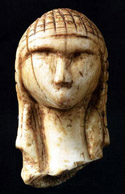Anthropology, Department of

Department of Anthropology: Faculty Publications
Document Type
Article
Date of this Version
2021
Citation
20th International Rock Art Conference (IFRAO) 2018
Abstract
TO INFLUENCE?: EXPLORING THE SOCIO-ECOLOGY OF ZOO-MORPHIC IMAGERY ON THE NORTHERN COLORADO PLATEAU
Figurative zoo-morphic imagery is but one of a broad variety of created morphologically distinct depictions that can be used, both in isolation and in complexly configured modes of communication, to exploit the sensory responses of viewers. While contemporary observations of zoo-morphic petroglyphs and pictographs (i.e. rock-art) elicit varied interpretations and assignments of meaning relative to broader re-constructions of past socio-cultural systems, it is often assumed that the imagery reflects the creator’s intimate knowledge of behavior and habitat of the subject. In contemporary and recent historic times communicating visually the behavioral characteristics of a species is made often in the absence of interaction or proximity with the subject species while meaning and significance of the imagery is supported within a socio-cultural history and environmental setting. This paper explores varied social conditions and settings within which images depicted of particular species communicate information to targeted observers. I assess the extent to which the creation and placement of zoo-morphic imagery, through time, may intentionally be employed in an attempt to influence or manipulate the behavior of others. With this background I suggest measurable propositions with which to initiate a search for potential patterning in the placement of pre-historic zoo-morphic imagery within the Colorado River drainage system of Utah.


Comments
Copyright 2021 (c) Ralph J. Hartley
*This paper is a revised and expanded version of that which was prepared for the 20th International Rock Art Congress (IFRAO), Aug.29-Sept.2, 2018. Darfo Boario Terme, Valcamonica, Italy.